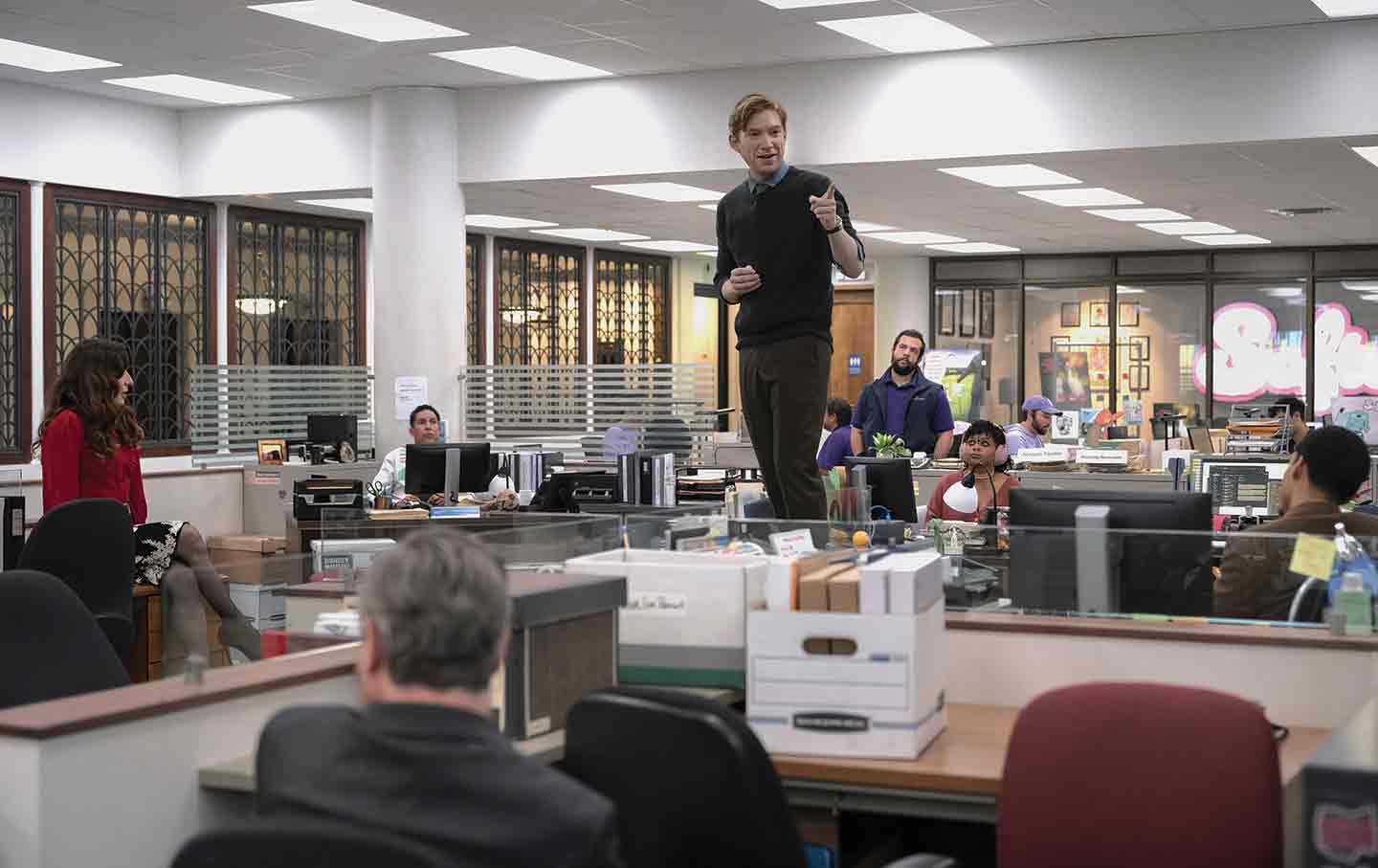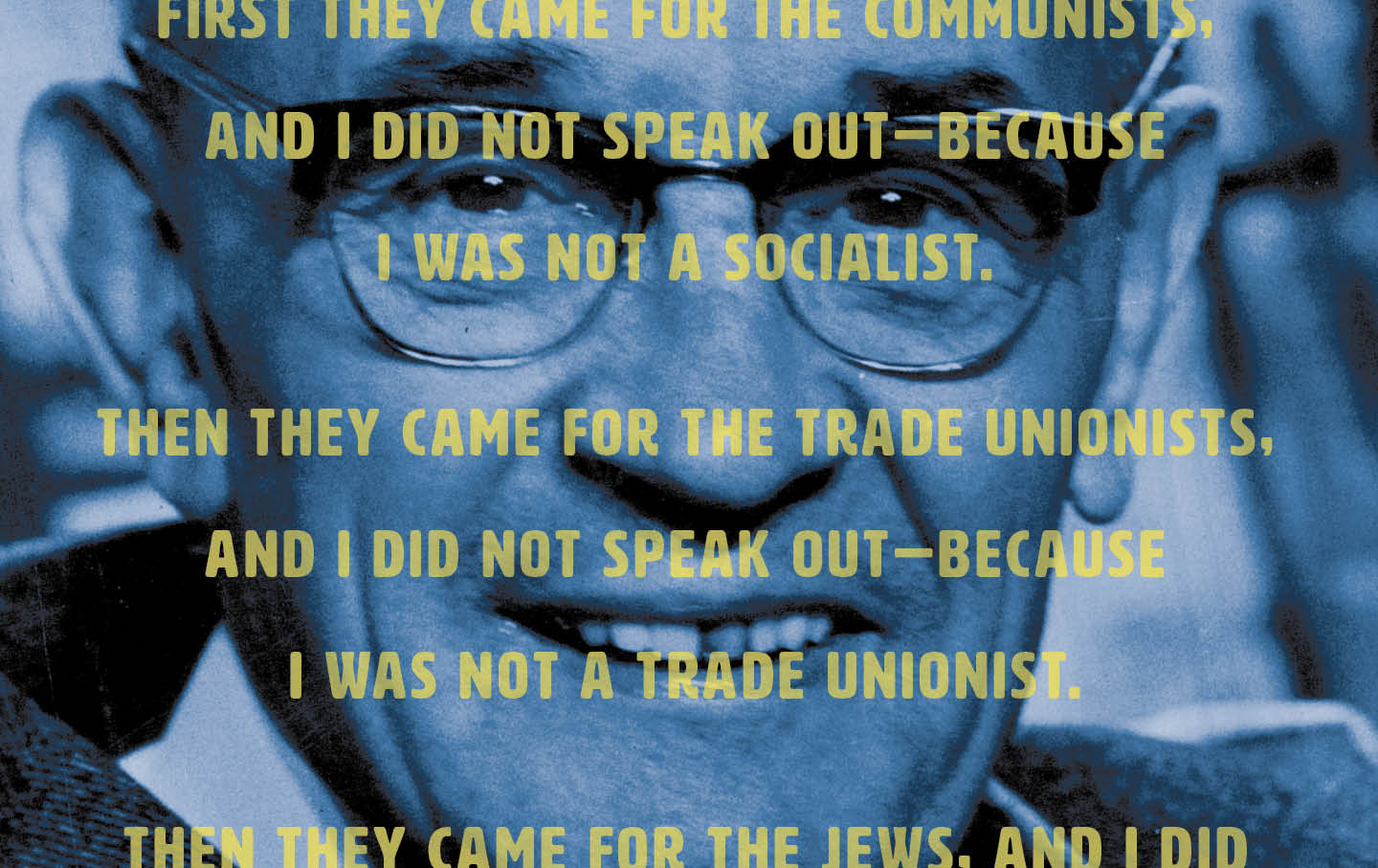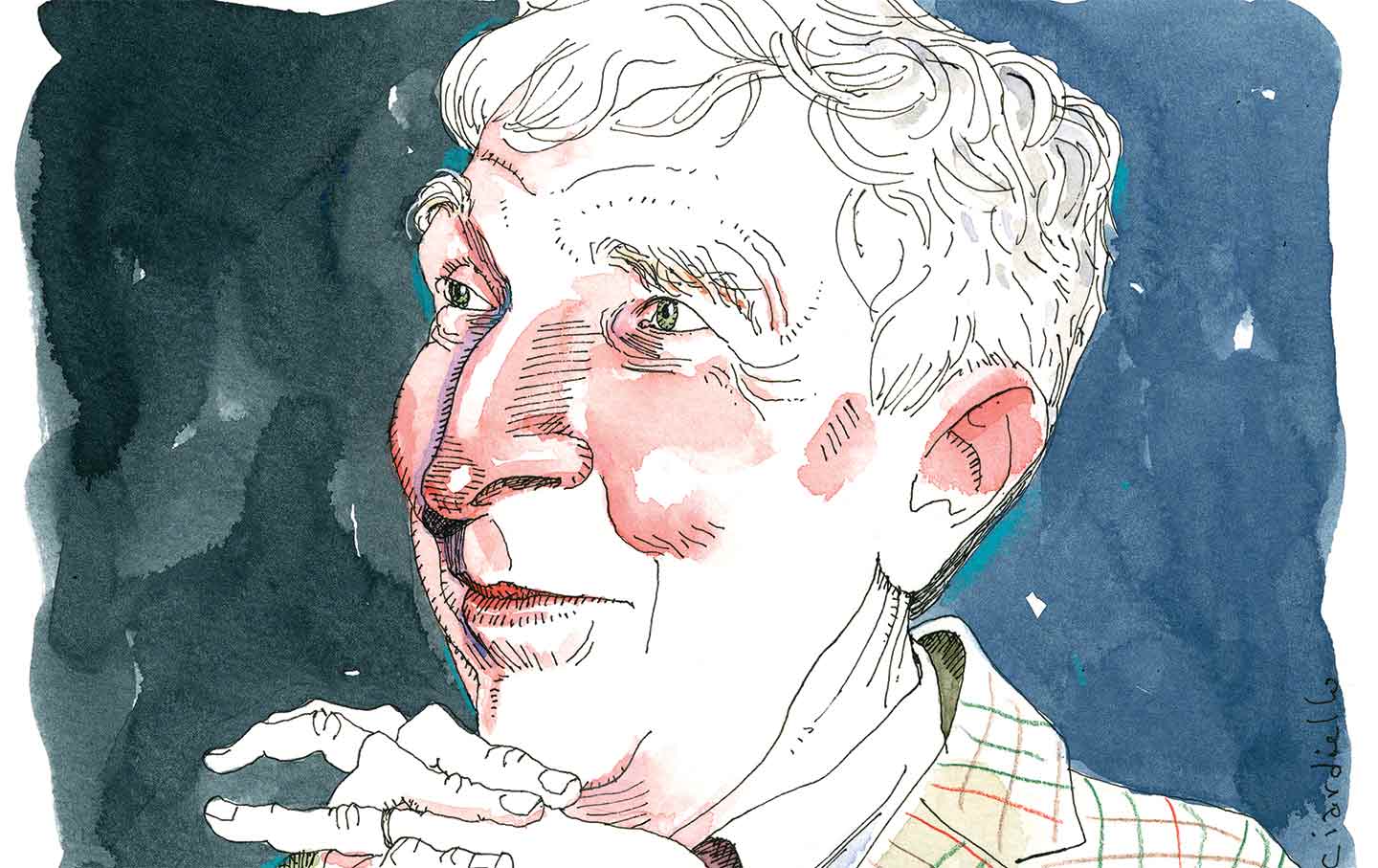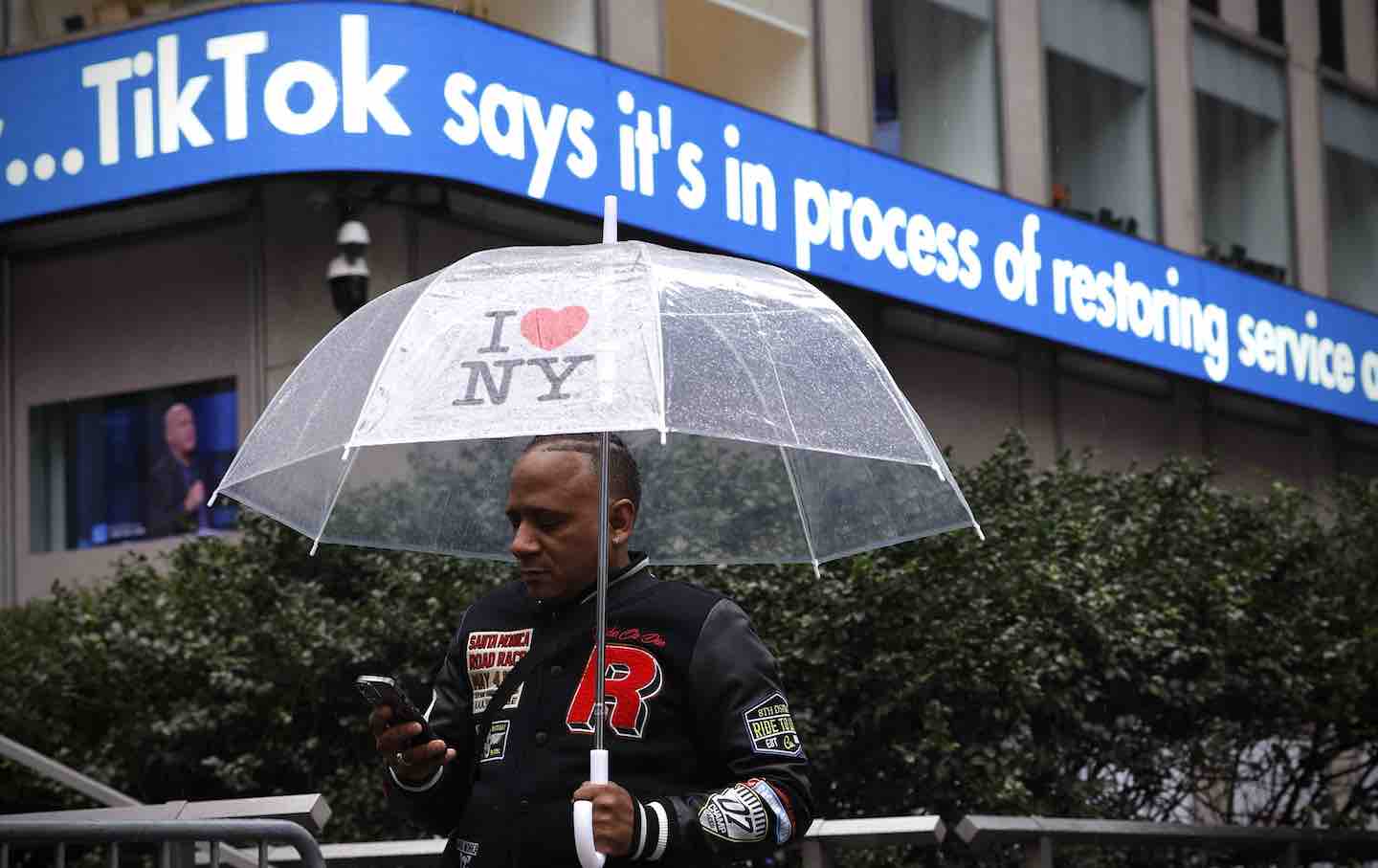Lamb’s People
The uncomplicated intrigues of Slow Horses.
The Ornery Intrigues of “Slow Horses”
Emblematic of post–prestige television drama, AppleTV+’s spy thriller relies on the dyspeptic repartee and verbal sparring instead of sophisticated plot twists.

The slow horses of Slow Horses used to be agents, analysts, or operatives working out of the headquarters of MI5, Britain’s domestic counterintelligence agency. But these are not retirees put out to pasture; they are the rejects, misfits, and screwups relegated to a dilapidated building called Slough House, condemned to spend the rest of their days on mind-numbing busywork. The man in charge is Jackson Lamb (zealously portrayed by Gary Oldman), the ornery, flatulent, and soused patron saint of slow horses.
Nothing is meant to happen in Slough House. The agents there do not officially run operations; their purview is supposed to be strictly desk work. But it’s because MI5 treats the place as a trash bin that things get interesting. The nasty truths that higher-ups would rather bury or burn or pretend never happened have a way of turning up, and Lamb and his band of “joes” keep finding their way to the center of national security scandals and crises.
The return of Slow Horses is good news for Apple TV+, especially since the company has recently announced plans to scale back its feature film ambitions. The show’s third season was one of the streaming service’s top performers as Apple TV+ enjoyed a record year for Emmy nominations, proof that though the viewership numbers may not be there, the money was still providing some returns. And in contrast to the numerous streaming series with inconsistent release times between seasons—cough, cough, Severance—Slow Horses has come out on a dependable schedule: Its fourth season arrives a mere nine months after we last said goodbye to Lamb and his misfits, and the fifth is already wrapped.
That might be why, anecdotally at least, Slow Horses is finding its audience. The series does not aspire to The Wire’s sophisticated critiques of society; it won’t challenge your notions of duty and marriage like The Americans did; it even avoids the pretensions to profundity of True Detective. But it is emblematic of where drama has gone in the post-peak-TV era: gilt production values, a movie star or two, perhaps a plot twist, and the uncomplicated watchability of the late-aughts cable dramas. It’s not homework, and it doesn’t feel like it is. Welcome to the era of prestige popcorn TV.
Slow Horses is based on a series of novels by Mick Herron, whose version of spycraft is about not the latest gadgets but raw, practical ingenuity—stealing a key card, having the right lie to tell, outscheming your opponent. But more important, the novels bestow their own dark humor and wry, sarcastic tone, and the show amps up the antic energy: Created by Will Smith, a veteran of Armando Iannucci’s acerbic workplace sitcoms, Slow Horses is like The Thick of It or Veep, except that your favorite characters might get shot.
Each of the show’s seasons is six episodes and spans a particular case from beginning to end. To some extent, each case can stand on its own, though the show takes advantage of our familiarity with its characters to find new ways of getting them into trouble. Usually, a body turns up or someone is kidnapped and a conspiracy starts to unravel. Lamb and Slough House are dragged into it, and the joes are sent off on their missions, alone or in pairs, so they can bicker like siblings, or call Lamb and bicker with him.
The slow horses of Slough House might appear broken and useless at first, but most of them are capable agents with a fatal flaw; they’re not incompetent, just imperfect. Some are being punished for real or perceived mistakes, like the otherwise capable Louisa. Some are just unbearable, such as Roddy, a certified computer genius who is so delusional and pathetically sexist that no one can stand to work with him. Others are compromised: Marcus gambles, Shirley has her anger issues (and a coke problem), Catherine is an alcoholic who is on the wagon and tries to run the office despite Lamb’s best efforts. Then there’s the new guy, JK Coe, who has not said a word since his arrival.
But the most prominent of the rejects is River Cartwright (Jack Lowden), our original entrée into the series and a former rising star at MI5 who can’t shake his blockbuster-level hero complex. River has all the skills to be that guy, except that every time he goes rogue to save the world, he gets himself into worse trouble. An unfortunate but conspicuous blunder put a halt to River’s budding career, but the Cartwright name still has pull at MI5 headquarters.
In the show’s first episode, River is tasked with rooting through a journalist’s trash. It’s nasty work, but it provides one of the show’s recurring insights: People can control how they present themselves, but if you want to see how someone really lives, you should look through their trash. That’s true for institutions, too.
After a couple of seasons in which he shared the stage with his colleagues, River is at the center of the latest case. His grandfather, David Cartwright (Jonathan Pryce), practically used to run MI5, where he was second-in-command. He’s an important source of counsel throughout the series, but age has caught up with the old legend, and memory loss and confusion have put at risk all the spiky secrets locked in his mind. It is tragic when David doesn’t recognize his grandson, but it’s far more dangerous when he thinks he’s briefing an agent in the middle of the Cold War.
In the face of terror bombings, right-wing extremism, rogue operations, and sleeper KGB agents, the true villainy in Slow Horses is all the things MI5 does in the name of security and of preserving itself. Though its brass would often prefer to toss its trash into Slough House (figuratively but sometimes also literally), secrets bubble to the surface. In season four, this becomes more personal than ever.
Although all of the slow horses are sentenced to Slough House against their will, Lamb relishes his state of semi-retirement (though perhaps not his responsibilities as warden) as well as the maneuverability it gives him. Lamb answers to no one and gets involved only when he feels like it. If spycraft is about information—manipulating, uncovering, or inferring it—Lamb is the genius always one or two steps ahead. If he has a code, it is the code of spycraft: Even if he loathes them, he protects his people.
Popular
“swipe left below to view more authors”Swipe →Jackson Lamb is the show’s most distinctive creation, and Gary Oldman its biggest star. In his image, the show coalesces its tone, point of view, and position in the marketplace. Lamb is a tortured male genius in a way that feels almost old-fashioned, made so distasteful that it feels novel. He is sarcastic and blunt and hostile to propriety. He acts like everyone is an idiot slowing him down, and they usually are. For a show in which characters relate to one another through the art of the insult, Lamb is at the top of the heap. He’s a Malcolm Tucker who doesn’t shower, a Logan Roy with no ambition, a Larry David without the irony.
Oldman’s Lamb is not exactly unprecedented; he’s just extreme. He’s the driving force and also the vehicle for a base, lowbrow humor, lest you start to take the show too seriously. Our first image of Lamb is of the holes in his socks; his first expression is a fart. In the third season we witness his version of a shower, which amounts to filling a cramped sink and splashing his pits with tepid water. As you might guess, Lamb’s personal hygiene and appearance belie his wit and competence.
Lamb’s capabilities are most often on display in his interactions with the leaders from MI5. The show relishes putting Oldman’s slovenly figure opposite Kristin Scott Thomas’s crisp and businesslike Diana Taverner. Taverner is “second desk,” or second-in-command, at MI5, and she’s often behind whatever shitstorm threatens to rain down on Slough House. While the other characters focus on the pieces in front of them, Lamb and Taverner play the whole board. But the show would stumble without actors of the stature seen here. Like Pryce’s David Cartwright flitting in and out of lucidity, Taverner only has whatever gravitas Scott Thomas brings to the role. That’s because for all her apparent ambition, Taverner is a character with simple aims: She merely wants to advance her career to the next spot above her current one. Like the MI5 itself, she exists only for her own preservation and advancement. Taverner is always politicking, but with no politics.
Depending on your point of view, this is either a feature or a bug of the series as a whole. Even in the first season, when a white-nationalist terrorist organization forms the immediate threat, the group’s politics are so cartoonish as to be toothless; its views exist only so that we may dismiss them. Peter Judd (played by Samuel West as a sleek version of Boris Johnson) makes the appropriate incendiary comments, but who knows what he actually believes. Belief isn’t something that enters Taverner’s mind either, or that of Sophie Okonedo’s Ingrid Tearney (the director, or “first desk,” of MI5) when she negotiates with or attempts to outmaneuver Judd. There are no true believers in Slow Horses, no one doing it for the love of duty or country, just as there is no real political view behind any character or action of consequence.
In the same way the spycraft in Slow Horses strives to be unfantastical, the show’s politics are unphilosophical; Lamb and Taverner’s arguments are strategic, not existential. Lamb is an acceleration and a step backward. He is a test of how detestable you can make a character and still be entertained by him. Lamb has crafted himself into the ultimate misfit and outcast of the system, but without a critique of the system, and of course no critique of his own role in it.
And through four seasons at least, there’s been no risk of that pesky self-awareness coming around the corner. But that suits the show just fine. Details like that would bog it down, or at least give us more to think about—and that’s not what Apple TV+ is aiming for. As with its other recent successes (see Hijack and Presumed Innocent), the streamer is serving up the aesthetics of prestige with the pulpy, twisty pleasures at which TV has always excelled.
On this measure, Slow Horses is a triumph. You can watch it with your roommates, your parents, or your grandkids. It’s funny, tonally consistent, serialized yet self-contained. Each season of the show boasts a different director, but you won’t notice unless you’re looking for that. It’s sleek, but not stylish; it’s grimy, but in a cool, clean way. And though it’s a show that relishes banter and verbal sparring, the action set-pieces are what truly draw you in: tragic chase sequences, attempted heists, infiltrations, sieges, and shootouts. Beneath its fanfare of sharp elbows and dyspeptic discontent, Slow Horses intends to go down easy. Like Jackson Lamb in Slough House, there are benefits to just being the sideshow.
More from The Nation

“The Paper” and the Return of the Cubicle Comedy “The Paper” and the Return of the Cubicle Comedy
The new show from the creators of The Office reminds us that their comedic style does now work in every “workplace in the world.”

The Strange Story of the Famed Anti-Fascist Lament “First They Came…” The Strange Story of the Famed Anti-Fascist Lament “First They Came…”
In his celebrated mea culpa, the German pastor Martin Niemöller blamed his failure to speak out against the Nazis on indifference. Was that the whole reason?

The Grand Delusions of “Marty Supreme” The Grand Delusions of “Marty Supreme”
Josh Safdie’s first solo effort, an antic sports movie, revels in a darker side of the American dream.

John Updike, Letter Writer John Updike, Letter Writer
A brilliant prose stylist, confident, amiable, and wonderfully lucid when talking about other people’s problems, Updike rarely confessed or confronted his own.

TikTok’s Incomplete Story TikTok’s Incomplete Story
The company has transformed the very nature of social media, and in the process it has mutated as well—from tech unicorn to geopolitical chesspiece.



